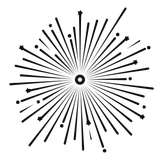Looking at the Night Sky
On rediscovering a sense of wonder.

All the streetlamps are turned off when we disembark the tram one night. My new borough continues to implement la sobriété énergétique to help counter the energy crisis in France. I'm still uncertain when it’s put into practice; it never seems to fall on the same weekday. While the days have become longer, it's inconvenient to come home after sunset. When this happens, I whip out my phone, turn on the flashlight, and try not to get frightened by the nocturnal cats hiding in the bushes.
Yet, these nights grant us the opportunity to observe a patchwork of stars in our neighbourhood. While they’re discernible most of the time, turning off the streetlamps is like turning on a switch that makes the sky glow brighter. Lately, there is a shiny star that hangs low in the western sky. It’s so close and luminous, I’m convinced it’s a satellite.
I know how to find the Big and Little Dipper, a skill taught to all Canadian children. I can also identify Orion’s belt and Cassiopeia’s W. There’s a triangle somewhere, but don’t ask me its name. For one particular school assignment, I remember having to observe the night sky and note all the stars I recognized. When my late uncle heard about my homework, he offered to take me to a park on the outskirts of the city. We dressed in layers, corralled a few other family members, and headed out. I don’t recall the season, but it was cold; my stubby fingers quickly numbed as I attempted to redraw the celestial map before my eyes. We had little in common, my uncle and I, but that night we bonded over a spectacular display of shooting stars. And for a moment, we shared a sense of awe as we basked in the universe's expansiveness. I can't remember the last time I felt the same sense of wonder. Until now.
As we make our way home in the dark, I direct my husband’s attention to the bright object in the sky. “I think it’s a satellite.” His contrarian nature, of course, challenges this assumption, so we search for a sky map app on our phones to confirm. Passing headlights blind us for a moment. The driver must wonder what two individuals are doing on an empty street corner, looking at their mobiles in the dark.
My husband directs his phone to the sky. The bright shiny object is, in fact, Venus. “Look, two stars over,” he says. “That’s Mars.” It’s small and faint in comparison, but I can see its red faded hue. Like decorations in a Nativity scene, our planetary neighbours hang above my home. I can’t believe what I’m able to witness with my bare eyes.
A few days later, I’m seated with an accountant, an illustrator, and a kids’ story developer for lunch at my coworking space. They talk about a new exhibition at our local science museum, focused on the bicentennial of a meteorite landing in the centre of our town. The night sky inspired curiosity and wonder, leading to discoveries and revelations, the developer says. Something we’ve lost.
Katherine May ponders on this exact loss of magic in her latest book, Enchantment: Awakening Wonder in an Anxious Age. She reflects on “how fleeting encounters can unpack a vast repository of meaning.” Beautifully written, it’s THE book I needed to read in this post-pandemic transition. May captures the perplexing entanglement of disconnect and sense of lacuna I could not express over this past year. She also devotes an entire chapter to meteors!

In her book, May describes a ten-hour car journey to Exmoor to catch a glimpse of some shooting stars. I learn there are 12 regular opportunities to see meteors each year, given the right conditions. With my borough's energy-saving policy, I hope to be lucky enough to view some from my backyard. We just missed the Eta Aquarids, which peaks at the beginning of May each year. The next meteor shower will be the Southern Delta Aquariids, but it’s difficult to distinguish here. So I’ll be looking forward to what NASA calls the “best meteor show of the year” in August when Perseids will be visible.
A few other things worth sharing
- Did you know that being a meteorite hunter was an actual job? It pays a lot of money (and is also a little dangerous).
- My favourite bands have been releasing comeback albums in the last two years. I guess I have the pandemic to thank for this. These days, I can't stop listening to Florence + The Machine's latest collection of songs and poetry.
- Two things I can’t resist are home decor shows and learning about other people’s creative processes. Maybe because I get a glimpse into their inner lives.Roxane Gay from The Audacity offers a peek into her creative journey here.

This is my favourite quote from the article:
“Writing was a muscle I exercised until that muscle became what I needed it to be.”
- Roxane Gay
On that note, let’s go to exercise some muscles.
Happy writing, happy creating!
G.G. Law







